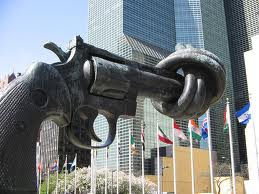Why Surrender your gun when you can Lobby for More?
The shooting rampage in Tucson, Arizona, in which six people were killed and 13 injured, prompts us in other countries to ask why we don’t kill each other quite as much Americans do. The sheer number of guns in the streets of US cities would seem a good place to begin – but that would be naïve.
The solution, as numerous pundits would have us believe, is to have more, not fewer guns.
Internet forums have been humming with debate, some calling for more checks so applicants with mental illnesses like the killer Jared Loughner might be barred from buying a firearm in future.
Others insist it’s only by being armed that Americans will be able to defend themselves. One Georgia group is even trying to advance legislation that would allow firearms in churches, synagogues and mosques.
The idea is that parishioners who pack would take out the uninvited infidel before he can rush the altar.
It seems the Georgians are already preaching to the flock: popular support for guns has surged over the past 15 years.
In the 1990s only 35% of Americans polled said it’s more important to protect the right to own guns than control ownership, while more than 60% wanted more control and oversight. Support for gun control has since dropped to just 46%, and a Pew poll released after the Tucson shooting showed almost no increase in public support for gun control measures.
Americans fond of firearms have dedicated sponsors on Capitol Hill. The 2004 ban on the kind of high-capacity ammunition magazine Loughner used in Tucson had been allowed to expire. And while no one expects fundamental reform from the Republicans, Democratic silence on the issue has contributed to festering gun violence: since 2000, there have been more than 11,000 gun-related homicides every year.
In Canada, fewer than 200 homicides are typically committed with a firearm any given year. So it’s bizarre to read a plea for the right to bear arms not in an American newspaper, but by Canadian columnist Barbara Amiel, wife of newspaper baron and fraudster Conrad Black.
“I’d be all for gun control if it would help rather than aggravate the situation – if you could remove guns from criminals or insane people alone,” Amiel opines in Maclean’s magazine.
“But it makes no sense. After all, a life or two might have been saved if someone in that crowd at Safeway’s had had a gun in their handbag.”
Actually, Joe Zamudio did have a firearm in Tucson on January 8.
As he rounded the corner, he saw a man holding a gun. “And that’s who I at first thought was the shooter,” Zamudio told Fox News. “I told him to ‘Drop it, drop it!’”
But the man with the gun wasn’t the shooter. He had wrested the gun away from Loughner.
Zamudio counted himself “lucky” for pausing before firing into the crowd. “Honestly, it was a matter of seconds. Two, maybe three seconds between when I came through the doorway and when I was laying on top of [the real shooter], holding him down. So, I mean, in that short amount of time I made a lot of really big decisions really fast. I was really lucky.”
Not everyone would have exercised that kind of restraint. Nor would they necessarily benefit from the help of a number of (unarmed) bystanders telling him who the real culprit was.
The idea that merely carrying a gun is all one needs to stop violent crime is such an absurdity that we should ask Amiel whether she has turned to writing satire.
Part of the horror of such events is that they degenerate quickly and unpredictably. Expecting untrained citizens to suddenly identify the good from the bad and act with laser precision is a fantasy inspired by Westerns and staggeringly simplistic thinking. Trying to increase security by arming everyone to the teeth is about as wise as driving an SUV with the windows up to get away from traffic pollution.
The inane mantra, ‘guns don’t kill, people do,’ rather misses the point. People have a funny way of getting their hands on them. Guns are used with the ruthless contempt for life that leaves many dead at a crime scene. They’re handled with the clumsiness that kills by accident, and are picked up by children, who discover guns at home and bring them to school, with tragic results.
Researchers at the Harvard Injury Control Research Center found that homicide rates among men, women and children are higher in states where more households have guns. States in the highest quartile of firearm prevalence had firearm homicide rates 114% higher than states within the lowest quartile of firearm prevalence. In short (for gun advocates who are still reading), more guns = more deaths.
Not only are there enough guns to arm almost every American citizen, many more seep through borders and into neighbouring countries every year.
Neither Mexico nor Canada asked for the right to bear arms, but we bear the brunt of America’s most odious export every day.
The majority of guns used in Mexico’s crime activity and deadly drug wars come from the US. Many of the guns used in Canada’s violent criminal activity are smuggled from south of the border – even as Washington lectures Ottawa about border security.
It’s not just lax laws that kill Americans, Canadians and Mexicans. And the US is not only the most violent among ‘developed’ nations. It’s also the most unequal, where the bottom fifth of the population earn the same meagre salary they earned two decades ago, where a growing number of Americans survive on food stamps. And where they’re encouraged on cable TV not to lobby for better living conditions and health care, but to vilify those with different views and identify their political enemies through the gun sights on Sarah Palin’s facebook page.
One such target was Congresswoman Gabrielle Giffords, who was among those shot and hospitalized in Tucson.
Lamentable educational levels, combined with a culture that encourages not so much honest analysis as unfocused rage; an ocean of guns, combined with a system that loses track and leaks them to traffickers who smuggle them abroad.
Addressing these questions may move us closer to finding out why the world’s most economically advanced country remains one of the most dangerous.



